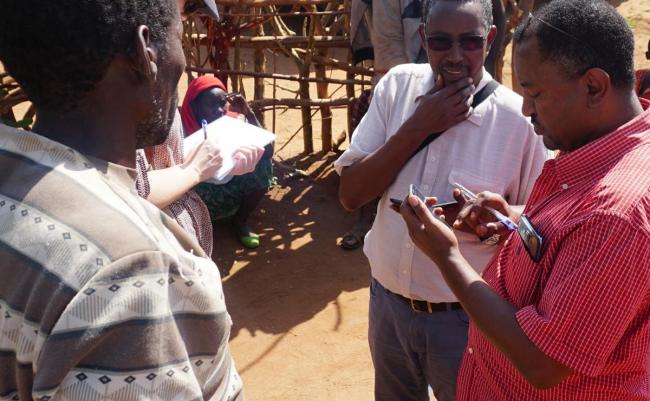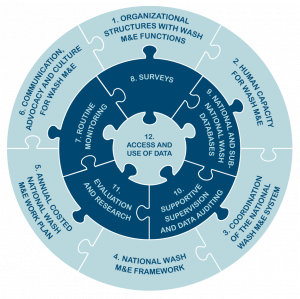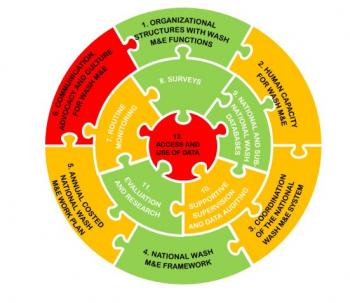Government, donors, and implementers must come together and invest in national and sub-national systems.
Published on: 21/08/2017

This blog has been co-authored by Nicolas Dickinson.
In a recent discussion, a National Rural WASH Coordinator outlined his country's data requirements. They needed to know about the distribution and quality of services, functionality, water quality, who provides the services and how they are managed. They wanted maps showing individual water points that could be clicked on to reveal all the technical details an engineer could hope for. They also needed information to share with Parliament that showed the progress they have made towards achieving the national targets and the new Sustainable Development Goals (SDGs).
This was quite a wish list. There was barely any reliable data on WASH services in rural areas, and it was easy to be ambitious about additions. But what would it look like and what will it cost?
Getting out into the country, visiting schemes and people, and collecting data can be hugely informative. When surveys are designed to align with national indicators you can measure performance and collect the required figures on coverage and functionality. The technical data collected can be shared with local government for fixing the broken schemes. When everyone in the sector follows the same standard, it becomes easier to compare and improve decision making, and then monitoring leads to better results across the board. But when these data are collected outside of a national monitoring and evaluation system they fall far short of the potential benefits.
But what constitutes this national monitoring and evaluation system? It's the people and processes that bring it all together.
Capacity is required across national and local government, non-government organisations and private sector organisations to formulate policy, guidelines and regulations at national government level. It is essential to create an enabling environment for monitoring whereby local government, service providers and civil society can undertake effective WASH monitoring. Capacity is also required to operate systems and ensure the skills are in the right place across the country. Local governments require the capacity to collect and report information, interpret results and carry out changes to service delivery.
Establishing the institutional and governance framework underpins monitoring activities. Roles and responsibilities need to be institutionalised to ensure continuous monitoring. Processes include the policy frameworks for setting targets, norms and standards, indicator frameworks and definitions of service levels, financing frameworks for ongoing monitoring and reporting requirements. Processes and procedures must be established for collecting, cleaning, validating, verifying, analysing, visualising, disseminating and using monitoring data.
Country-led monitoring does not mean just one monitoring system - there can be multiple systems enabling the monitoring of different aspects, for example, a Ministry of Health system tracking sanitation and a Ministry of Education system tracking water in schools. Additionally, each system may make use of different information and communication technologies to support the people and processes and make monitoring cheaper, faster, and more inclusive.
Government-led teams in nine countries across Western and Central Africa recently completed a participatory assessment of their national and sub-national Monitoring & Evaluation (M&E) systems. Using a comprehensive framework that supports a deep-dive investigation into 12 components that underpin WASH M&E, the countries were able to establish a detailed picture of the current state of national and sub-national systems. The framework was developed as part of a programme involving UNICEF, IRC and Akvo, funded by the Netherlands Ministry of Foreign Affairs.
 |  |
The findings show similar results across the countries. Whilst all had previously established water point mapping baselines, these 12 foundation blocks that underpin routine monitoring activities were largely missing. Very few countries had established a national WASH monitoring and evaluation framework or nationally agreed indicators sets, and very little financial information was available upon which annual activities could be costed and planned.
Findings and recommendations from these assessments will support the development of investment plans and eventually the establishment of dependable systems that can provide usable data to inform local, national and international requirements. Fatigue from rapidly outdated baselines is now shifting the focus from new data collection apps towards national systems. There is strong interest and willingness from governments to reset this focus.
Some national systems overlook specific needs at local level. Local government needs more detailed data on WASH services to respond when there are problems and support service providers. In Ethiopia, a new regional monitoring system helped ensure boreholes continued to function during the recent drought. Whilst the existing services came under increased pressure, the continuous flow and accessibility of service-level data enabled the regional water bureau to coordinate mobile maintenance teams to address issues at poorly functioning boreholes before they failed. This real-time monitoring initiative works to ensure data flows contribute to improved services and not just coverage figures. It is essential that national systems incorporate the sub-national monitoring processes as well.
WASH monitoring and evaluation are often seen as baselines and ad hoc surveys at national and project level. To establish routine monitoring, there is a need to strengthen country-led monitoring. The National Rural WASH Coordinator from our example above is often pressured to monitor programmes based on donor requirements, even when these do not match national needs. Donors may encourage the monitoring of activities in parallel to national systems and miss out on the benefits of routine national monitoring and long-term results. With the establishment of new international indicators for the SDGs, regional monitoring indicators (for example AMCOW in Africa; SIASAR in Latin America), the National Rural WASH Coordinator is juggling many balls at once. There is a need in-country for government, donors, and implementers to come together and invest in national and sub-national WASH monitoring and evaluation. When this happens, it will be easy for the National Rural WASH Coordinator to imagine and establish a National WASH Monitoring and Evaluation System and achieve results.
At IRC we have strong opinions and we value honest and frank discussion, so you won't be surprised to hear that not all the opinions on this site represent our official policy.